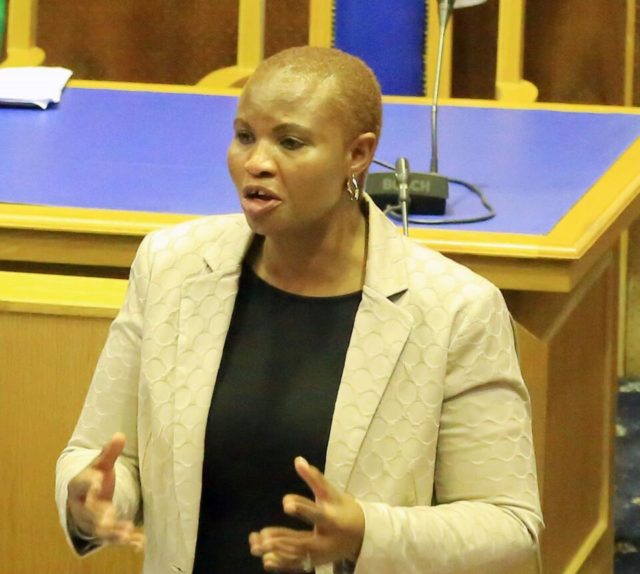While Sol Plaatje Municipality’s proposed electricity increase for the 2022/23 financial year is 6.82 percent, consumers will also be charged an energy charge as well as a capacity demand charge as from July 1.
WHILE Sol Plaatje Municipality’s proposed electricity increase for the 2022/23 financial year is 6.82 percent, it is envisaged to rise by 10.54 percent in 2023/24 and 9.04 percent in 2024/25.
City consumers will also be charged an energy charge as well as a capacity demand charge as from July 1 this year.
Meanwhile, employee costs constitute 34 percent of the municipal budget, where 2,701 employees are on the payroll.
The municipality has budgeted for salary increases of 4.1 percent for the fiscal year.
The executive mayor receives a total remuneration package of R1.2 million, while the Speaker receives R991,012 per annum.
The municipal manager is entitled to a R2 million package while the chief financial officer earns R2.2 million per annum.
Senior managers for corporate services, community services, strategy, economic development and planning and infrastructure services each receive R2 million per annum.
Executive committee members receive R9.3 million in total while the cost of all other councillors amounts to R23 million.
The budget indicated that bulk purchases for the medium-term expenditure framework for electricity has a total budget of R647 million.
It was noted that the sale of electricity represented a major revenue source that contributed to 36 percent of the total revenue of the municipality.
“It is important to note that any non-collection or non-payment or non-billing for electricity has a higher impact in as far as the financial health of the municipality is concerned. It is for this reason that all revenue protection measures be put in place to protect this revenue source.”
It was also stated that electricity was “by far the biggest item billed” at 67 percent of all service charges combined.
It was advised that the increases were needed as they wanted to increase the number of councillors at Sol Plaatje Municipality.
The municipality will withhold 30 percent of payment from households in arrears while metres that have been inactive for more than 90 days will be blocked.
During a council meeting last week, DA councillor Elize Niemann questioned why the municipality had not taken steps to recover the R3 billion that it was owed in the debtor’s book.
She also stated that no public participation had taken place regarding the electricity increases.
“Residents are being punished for using electricity,” said Niemann.
FF+ councillor Kobus van den Berg advised the municipality to deal with illegal connections, while ACDP councillor Roddy Loff disagreed with any electricity increases.
EFF councillor Kenneth Kock believed that the municipality should begin by addressing the billions of rand owed to it by state entities and businesses.
“Millions of rand is owed to Eskom and council has not outlined any agreements to make payment arrangements.”
DA councillor Christopher Phiri added that should outstanding debts be recovered, it would not be necessary to increase electricity tariffs.
Tumelo Mosikare from the Sol Plaatje Community Forum stated that residents and businesses would be slapped with a basic capacity charge of R246 along with the tariff increase.
“Electricity will be unaffordable for domestic households. It is unacceptable that no steps are being taken to recover electricity losses amounting to R144.9 million.
“The average purchase price is R1.12 while ratepayers pay R2.04 per unit, where the mark-up is 45 percent.”
He believed that the increased tariffs were being “steamrolled” by council.
“This can cause havoc in the city, where more people are unemployed and businesses do not want to invest.”
The CEO of the Northern Cape Chamber of Commerce and Industry, Sharon Steyn, stated that public participation meetings with businesses had been postponed for the third time this week.
She pointed out that businesses need at least three days’ notice to attend these meetings.
“Local business wants to work with the municipality but has objected to the exorbitant electricity hikes. It is killing businesses and they will simply leave Kimberley, resulting in less revenue for the municipality. Investors are not willing to invest in the city given the high cost of electricity and poor service delivery. It appears as if the municipality cannot give us any answers. We tried to meet with the mayor and were informed that no decisions can be made until a municipal manager is appointed,” said Steyn.
She believed that the new tariffs were being rushed through without adequate consultation.
“Where business was paying around R1.40 per unit, it will now increase to around R2.76 per unit.”
Sol Plaatje Municipality chief financial officer Lydia Mahloko stated that public participation started on May 9 and was ongoing this week.
“We submitted the proposal to the National Energy Regulator of South Africa on April 22. Councillors will also go out to their respective wards to inform residents,” said Mahloko.
She pointed out that there would never be a zero percent increase on electricity or the provision of services.
Mahloko cancelled a public participation meeting that was supposed to be held for businesses, non-governmental organisations, churches, schools, old-age homes and communities on Wednesday, upon instruction of the Speaker.
“The meeting will most likely be postponed until Tuesday at 3pm. The meeting was supposed to be held on May 13 but could not proceed because of the water shutdown.”
The executive director for strategy, economic development and planning at Sol Plaatje Municipality, Nomonde Tyabashe, indicated that the virtual meeting could not be held over the weekend as residents had other commitments, while the only time available for the meeting on Monday was at 5pm.







